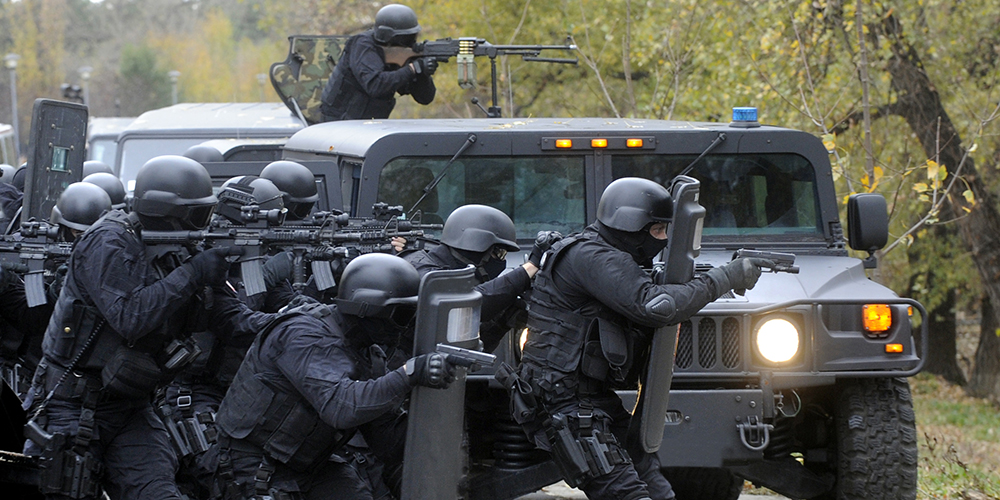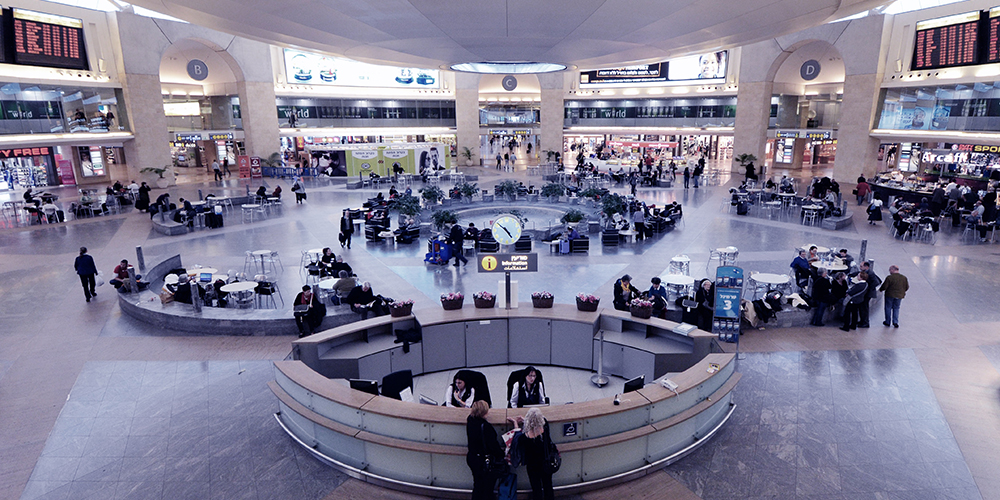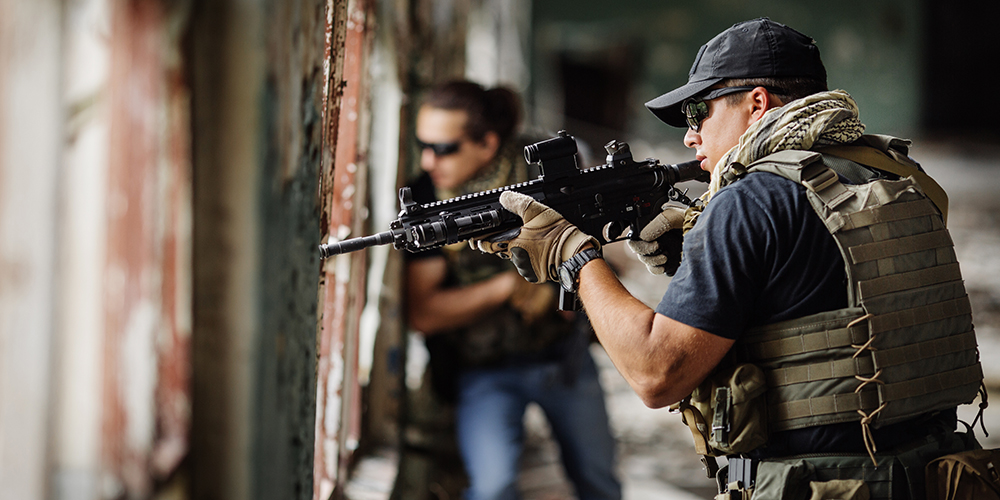Lock Blog
A resource for consumers, locksmiths, and security professionals
A resource for consumers, locksmiths, and security professionals

In a world where the threat of terrorism is clear and ever present, it is getting harder and harder to say what is outrageous when it comes to security. Is it true that only the paranoid survive? Is it possible to be over prepared? Let’s talk about the extremes and the extremely crazy sides of security and find out. This list will have you asking yourself, “Has security gone too far?” We will examine when security is invasive. When security is massive. When security is unregulated. When security is worth ridiculous amounts of money. And when security leaves the world confused. But don’t worry, we will also be telling you what it all means to you because everyone can learn a lesson from these crazy security plans. Stick around to hear about all of the wild things people do to plan their outrageous security.

When the arms race came to a close after the Cold War, the government began to decommission some of their nuclear assets. As a result, it was no longer feasible to maintain a missile silo, because the missiles were gone. In the end, these properties went up on the market and depending on your luck and knowledge, you can get them for quite a steal. One man bought a decommissioned Atlas E missile silo for around $40,000. For that price, you get an amazing amount of protection. The security of a base like the one for the Atlas E can withstand the detonation of a nuclear warhead dropped only a mile away. These homes vary in the particular protections they offer, but they were all designed with the same desired goal of protecting the most dangerous weapons on the planet. With a set of two magnesium doors, each weighing about a ton, you might think that this level of protection is impractical for a household.
It may be true that the level of protection is excessive, but the practicality was designed into the system. It is what you need if you are preparing for doomsday. These bases were built for tens of millions of dollars a piece back in the 1960’s. To give you a frame of reference, ten million dollars back them would be worth a little over $80,000,000 now. However, it is often quite an undertaking to make these spaces livable. Most silos have fallen into disarray and will need some form of retrofitting. But once you are done, and living inside, you will have a home that was meant to withstand every conceivable threat floating around the heads of generals during the Cold War. The redundancies in protection and construction materials, give you home safety built into your purchase.
The most important takeaway is that you are not always starting from ground zero. Most of the time your home will already have some level of security preinstalled. Your natural protection could be steel core doors, close proximity to a police station, plenty of nighttime lighting, etc. You can look for security before you buy/rent. This is also an important reminder of the role that money plays in security. The investment in these silos was meant to provide the nation’s most deadly assets the most secure housing possible. By looking at the construction, and researching the security procedures of these structures, you can get a better sense of how the military handles their security.
No matter what your feelings are on the subject of the military industrial complex, you cannot dismiss their attention to security. Even if the cold war had us overly paranoid about the sabotage of our missile facilities, it made these bases capable of thwarting the perceived threats. Remember that if you can perceive it, you can prevent it. It is only what you cannot plan for that you cannot control for. Think of the one-ton Magnesium doors on these silos. They were made to take the direct impact of a missile. That attack would have been pretty impossible on the first door, let alone the second. But by planning for something that large, they were protected against anything smaller.
In the country of Japan, zoos take the threat of an animal escape very seriously. Escape drills are held every two years in the attempt to prepare employees for these types of scenarios. There is nothing too crazy or outrageous about running drills, in fact, that seems like standard fare. But wait, there’s more. These drills are simulated by staff members who are pretending to be these animals. And better still, they are dressed in mascot costumes while they play pretend. It is a little troubling to see these drills, as they appear to be preparing people wrong. During their gorilla escape drill, they lift the gorilla into their vehicle, largely by using the net they have wrapped him in. A male gorilla in captivity can weigh up to 600 pounds. While tranquilized that would all be dead weight. If the day after this drill, a fully grown silverback were to escape, these same workers would be trying to figure out some way to lift him into the truck.
The two man rhino costume, at least, showed the size and shape of the animal more accurately. Though there is still the question of movement. These animals would all be more agile and faster than a human. Add the unwieldy mascot head to a random zoo worker, and you have something that is so far from real that it begs the question why bother? The polar bear was my personal favorite. During the drill, there were so many people playing dead, as if the drill had been based on their procedures not working at all. For that reason, I would say that the polar bear drill was the best preparation. They should know after this faux ordeal, how to handle the inevitable casualties of their security plan.
The best takeaway from this hilarious misstep in security planning is to make your drills realistic. If you cannot achieve any amount of realism, then you are doing yourself and your security an injustice. Everything about this drill is so wrong. If any of the animals attack, the vehicle that the tranquilizer gun is being fired from is not going to offer any protection. They are relying on the ability to get within a very close proximity to the animals before taking the shot. When they incapacitate the animal, the next step is to walk right up to it and poke it with a stick. Mind you this stick is not so long that it would offer you much distance to escape some of these animals.
There is nothing to act as a stressor. No one really seems to be taking the proceedings very seriously. And most act as if they are just trying to get it over with. This type of planning only works if people take it seriously, and are not being improperly prepared. I would argue that these zoo workers are now less prepared for an animal escape because the plans they have are so poor. Keep your security planning realistic, and take your protection seriously, or you will find yourself without the proper muscle memory for your emergency situation. When people get used to doing the wrong thing, it is much harder for them to readjust in the moment.

The craziest thing about the security in Israeli airports is how well it works. Well, some people would disagree that its track record is the “craziest” thing, but we will get to that) The level of detail the agents use to review potential passengers seems a little much. How much? Each person that is going through security is screened one on one by an agent. They have replaced the invasive nature of seeing through our clothes, taking our water bottles, and making us remove our shoes, for something much more comprehensive. The track record of the security speaks for itself. No hijackings or terrorism have taken place or been attempted, on Israeli planes in over 30 years. Besides the personal nature of this security, they also use ethnic profiling. This is a major taboo in most self-proclaimed “progressive” nations, but Israel does not apologize for this decision.
If you are not Jewish, you are going to be asked some further questions during your one on one interview. If you act suspicious from this point, the screening will continue to progress. If you have Arab lineage, you will be subject to the most stringent of questioning and personal searches. If you have any locks or security on your luggage, you will have to remove them to let the security officers investigate your belongings. Besides what is happening on the inside of the airport, the parameter of the airfield is also being surveilled. Remote controlled armored vehicles are constantly checking the security of the gates and surroundings of the field for packages and unidentified people. These drone cars can even detonate packages with remote explosives. On the planes themselves, Sky marshals fly on each flight and are trained to end any attempts at terrorism quickly and by any means necessary. Though they claim they can end a threat in seconds, there has never been an attempt to kidnap a plane during the 30 years of this increased security.
A kind of uncomfortable fact is that security means making quick assessments. Quick assessments rely on patterns and preconceived notions. You are looking for people that fit a particular profile. I always use the example of a man wearing a heavy jacket on a hot day. This is suspicious because it falls out of the norm. Is that man a criminal because he is suspicious? No. But there is nothing you lose by being aware that he might be a threat. As Anti-terrorist specialist Boaz Ganor says,
“Ethnic profiling, as problematic as it is, is the least least problematic counter terrorism measure, because at the end of the day you might cause some inconvenience to the so called suspect based on his ethnic profile by asking him another question or two questions all together, but you don’t really endanger his liberal or democratic values. And in return you might save life.”
Taking that down to the scale of personal security. If you are extra cautious when someone is acting out of the ordinary, you are not endangering that person’s freedom. You have not called the police, and you are not preventing them from going about their day. You may feel the need to ask them questions, and you can assess your course of action based on their responses. You may find that your preconceived notions were wrong altogether. It is this personalized interaction that has made Israel’s air travel so safe. And that is something you can use to make sure you are safe while traveling. Perhaps an open dialogue may help your security as well.

A branch of the U.S. Air Force known as Space command is responsible for all of the satellites in Earth’s orbit. The security they must plan for covers an area of roughly 73 trillion cubic miles. What is the threat? Out of the 11 countries that have the ability to launch objects into space, not all are our allies. And even some that are our allies do not always act like it. The security plan of this institution is to make sure that U.S. satellites can always get into space. That means making sure that space is not so hostile as to prevent more from being launched, and protecting the ones that are operational. This is a massive undertaking and requires investments in all facets of technology. With a problem so large and so new, there is very little to do except to plan for every possible contingency. The idea of space warfare is not based on the fear of weaponry. The head of Space Command has said, “And deterrence in the space world has got to be built on a little bit different construct. It’s the ability to convince an adversary that if they attack us, they will fail.” (Hyten).
Space Command’s new plans include building and positioning highly maneuverable satellites that would be able to evade an attack. They have anti-jamming protections so that control cannot be severed, which would immobilize the satellite. In order to detect threats a new radar system has been developed, which can track the location of an object about 12 inches in circumference (about the size of a grapefruit). In space, there have also been satellites placed with the sole purpose of monitoring other satellites. The government has denied the existence of any offensive interests in space. Claiming that we do not have lasers that will blind satellites, satellites that can perform sabotage on other satellites, etc. They have, however, admitted to having a very sophisticated form of jamming technology. What we do know is that there are more protections, but those are classified.
Head of Space Command, John Hyten, said it best when he said, “It’s the ability to convince an adversary that if they attack us, they will fail.” That is security. There is no perfect security. All you can do is get into the mind of your perceived advisory and convince them that attacking you is a waste of time. Prevention is at the heart of great security. Every bit of security you tack on makes one more criminal throw up their hands and say, “I’m not trying that! You would have to be crazy.” It is just a head game. If someone really wanted to undercut any security, they could. It would just take time. If you had money, it would take less time. But the fact remains that security buys you time. In the case of the government, it is supposed to buy them enough time to come up with a device to defeat their own security and build a protection that can undermine that device. Is it sustainable? Perhaps not, but it is the only option. You will always need to reassess your security.

Private Military Contractors or (PMC’s) are a security plan that comes with a security plan. By purchasing the services of one of these groups, you get planning for all aspects of a situation. Everything from backend logistics to training, to consulting, to tactical. These contractors can be hired for any type of security need, whether it is personal protection or national security. Their security usage extends to counter piracy in places like Somalia, as well as private bodyguard details. About half of the soldiers that are fighting for the United States are Private Military Personnel. This security is about cost savings. By using PMC’s for war, you can effectively lower the cost of your military investment. This decreases the number of enlisted national guard members that you would need to call in. Death, capture, and injuries of these private contractors do not add much to the outrage of war. It is a blind spot for most policy and political dealings.
The pitfall is that these organizations are not loyal to anyone. Their loyalty lies with the dollar. China uses these types of forces in Africa. Russian private military forces were used to take over Crimea. Eric Prince is the founder of Blackwater, and the man credited with creating the idea of the PMC. His claim is that during the course of over 100,000 missions there was never a person under their care killed or injured. Simon Mann, “The line between defense and offense gets very quickly blurred…Instead of sitting here waiting to be shot why don’t we go out there and bag the bad guys before they manage to shoot us. And suddenly, the rules start to get bent.” These rules may have been bent when Blackwater contractors opened fire on an unarmed car of people (allegedly). Killing everyone inside and those that were trying to flee (allegedly). In the type of combat situations that are less straightforward, pre-emptive action has become the trend. Mix that in with a lack of regulation, and the problem can quickly spiral out of control.
The largest issue with PMC’s is that their lack of oversight can lead to a misconduct. Why does this happen? It is because you need to know what is happening if you want to have a say in the remedy. Apply this in your own life by reading up on the services/products that you would like to purchase before you purchase them. Even if you cannot do something yourself, you should know the way it needs to be handled. It is also important to research the company you want to hire, if say, you need a locksmith. As PMC Sniper trainer, Mick Cowan, put it, “Morality is down to the individual and down to the companies themselves.” That is true for every profession. Even if you are talking about some brand name products, the company has its own set of goals. You need to find companies and distributors that value the security they offer more highly than money. You may consider using a business for something you can do yourself, and just see how they operate. Ask questions, and see if the service professionals are knowledgeable about their field. Ask questions you know the answers to, and if you are convinced, begin asking questions you actually have.

What if money was not a concern for home safety? What if you could get the best protection, with the best materials, installed by the most knowledgeable individuals in military level security? Well, if you could do all that, you might find it tempting to give it a try. This is the growing trend among the richest members of society. The types of precautions range from the cool to the absurd. Everything from helicopter pads on roofs to incapacitating gas that can be released by pressing a button on an iPad is for sale. But the idea of these high priced security precautions is that you are also buying convenience. I often say that security is about finding the balance between convenience and protection. When you start to get to this level of security, you are going to get an immense amount of both. With the use of a single thumbturn, you can throw bolts throughout the bomb proof door, securing your bomb proof entry point as you would the front door to any home. Panic rooms that look just like a bedroom made with ballistic walls, doors, and floors. Some will even go as far as building a ballistic bed frame so that a bomb detonated under the bed will feel like an earthquake.
But if you never want to feel an actual earthquake again, there is a solution for that as well. You can simply purchase some concrete pliers that dig well into the ground. Add some steel reinforcement to that concrete, and you are sitting pretty on even the shakiest of fault lines. It goes without saying that all of your windows would be made with at least 3-inch thick bulletproof glass. Also, CCTV surveillance so that you can document the criminals stupid enough to try and rob you. I mentioned before that some of these systems allow you to deploy gas and smoke, but your tactical options are really only limited by your laws. In foreign markets, the amount of force these companies will install for countermeasures will increase exponentially. In order to work with companies that offer this level of protection, we are talking about a minimum of 3 million dollars. From there the price will depend on what type of security you want to build, and how much custom work that demands. When you are not limited by your pocketbook, you are only limited by your imagination.
Sure, it pays to be rich, but how can you scale this down to relate to most people? It comes down to smarter planning. You can’t have everything and the kitchen sink because you simply can’t afford it. Chances are that you also don’t need it. Sure it would help. Everything helps. But you have a budget to keep to, so you will need to assess your security and find out what helps the most. From there you will need to do a cost-benefit analysis. See if it makes financial sense to invest in that protection. Your budget may restrict you to only using products that you can install yourself, and that may limit your choices. On the upside of a limited budget, having fewer options means fewer choices. On the downside, less choice can make those choices matter a lot more. It is quite a bit of work, and it is not as fun as just getting a super cool spy house, but it is practical. If you can’t be rich, you have to be practical. You literally cannot afford to be anything else. Don’t feel too bad, though. Most people are in your situation. And we are all just one lottery ticket away from an inordinate amount of wealth!
In the end sometimes crazy is what you need. Sure, if you get too crazy you might end up shooting a paper mache Rhinoceros in the hindquarters, but other than that, it might be the right move. The worst part about security is that you won’t know you need it until you need it. There is the horrible reality that your security will only work as long as it does. When it stops working, all you can do is learn from your mistakes. And sometimes the only mistake you made was thinking that you were safer than you were. Plan for the worst, and prepare well. There is such a thing as bad preparation. If you can see that no one is taking the security drills seriously, stop having them before they damage your preparedness. Buy/rent a home that has some good protections already. Even if it is just a good location, that can go a long way. Don’t let being considered judgmental stop you from realizing your potential threats. Pay attention to the people that are responsible for your security. Vote with your dollar, and chose the most experienced professional. And when it comes to protection, the stars are the limit. The quest for perfect security will never end. May your journey be pleasant and may your security be strong.
Category: Commercial, Lock Humor, Residential, Safety & Security